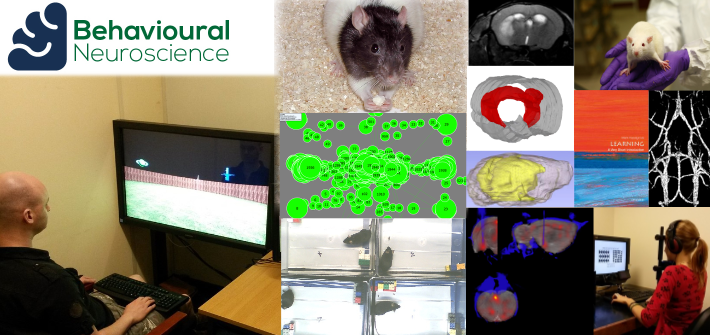Behaviour and Neuroscience

The Behaviour and Neuroscience group investigates psychological and neural mechanisms underlying behaviour and psychiatric and neurological disease.
We study psychological and brain mechanisms underlying behaviour and psychiatric and neurological disease. We closely integrate research in human participants with research in rodent models. This allows us to translate detailed mechanistic insights from rodent models to people.
One aim is to understand the conceptual basis of normal behaviour, using associative theories to provide explanations of key phenomena such as learning, attention, recognition memory and timing. Another central goal is to explain the neural mechanisms underlying these effects.
A further important objective is to produce insights into the psychological symptoms and their neural mediation of a wide variety of pathological conditions, such as schizophrenia, Alzheimer’s disease, addictive behaviours, stroke, and age-related cognitive impairment.
We combine a wide range of methods, including:
- behavioural testing in rodents and humans, preferentially using conceptually related assays across species
- pharmacological and genetic manipulations of brain function in rodent models
- translational neuroimaging
- in vivo electrophysiology in rodent models
Research areas
- Associative mechanisms underlying drug-seeking behaviour, configural learning, timing behaviour and recognition memory, including in ageing and dementia
- Spatial learning and memory
- Translational analysis of cognitive impairments, including in schizophrenia, ageing and dementia
- Devising new cognitive tests to detect early Alzheimer's disease and cognitive impairments related to other disorders
- Neuropharmacology and brain circuits underlying behaviour and cognition, including associative learning, in health and disorder, with a focus on dopaminergic and GABAergic mechanisms within a hippocampo-prefrontal-subcortical circuit
- The role of circadian CLOCK genes in cognition
- Impact of chronic pain on cognition
- Cerebral stroke and mechanisms of injury
- Improved animal welfare and validity of rodent models of stroke
Example projects and outcomes
Collaboration
We collaborate across the university with colleagues in biosciences, life sciences, mathematics, pharmacy, and medicine. We also participate in several interdisciplinary university-wide research groups and initiatives, including:
In addition, we have active UK and international collaborations, including with industry partners.
Join us
If you are interested in working with us towards a PhD, please contact the group member who you wish to work with.
We offer projects through the BBSRC, ESRC and MRC Doctoral Training Programmes. These programmes typically have deadlines between November and January for PhD projects starting in September of the following year.
Occasionally, funding may become available for specific PhD projects, which we will advertise on this page and on other suitable job pages.
We also welcome enquiries from candidates who have secured their own funding from other sources.
Research-led teaching
We mainly contribute to teaching in the areas of neuroscience, biological psychology and research methods on undergraduate and postgraduate courses in the School of Psychology.
Group members